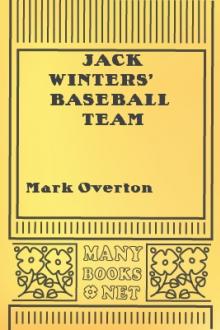Walter Sherwood's Probation by Jr. Horatio Alger (interesting novels in english .txt) 📗

- Author: Jr. Horatio Alger
Book online «Walter Sherwood's Probation by Jr. Horatio Alger (interesting novels in english .txt) 📗». Author Jr. Horatio Alger
“There's some mistake,” gasped the other.
“Perhaps so, but I have some doubts whether you came by it honestly.”
“I assure you it is my watch,” cried the other, uneasily.
“How much did you pay for it, young man?” asked the detective.
“Twenty dollars.”
“Very well, sir; give the boy twenty dollars, and I shall advise him to give the watch back to you, as it may be stolen property, which he would not like to have found in his possession.”
“But that will be paying twenty dollars for my own property. It was not to me he paid the money.”
“You will have to look to your confederate for that. I am not sure but I ought to make you give twenty-five dollars.”
This hint led to the stout man's hastily producing two ten-dollar bills, which he tendered to Walter.
“It's an outrage,” he said, “making a man pay for his own property!”
“Are you sure that your statements in regard to this man are true?” asked an important-looking individual on the opposite side of the car. “To my mind your interference is unwarrantable, not to say outrageous. Justice has been trampled upon.”
The detective looked round sharply.
“Do you know the man?” he asked.
“No.”
“Well, I do. I first made his acquaintance at Joliet prison, where he served a term of years for robbing a bank. Is that true or not, Jim Beckwith?”
The man known as Beckwith had already started to leave the car, but, although he heard the question, he didn't come back to answer it.
“I generally know what I'm about,” continued the detective, pointedly, “as those who are unwise enough to criticise my actions find out, sooner or later.”
The important gentleman did not reply, but covered his confusion by appearing to be absorbed in a daily paper, which he held up before his face.
“You let him off easy,” said the gentleman in the rear seat. “You allowed him to take the watch. I was surprised at that.”
“Yes; for, strange as it may seem, it was probably his, though the money with which he bought it may have been stolen. That watch has been probably sold a dozen times and recovered the same way. Were it a stolen watch, the risk would be too great. As it is I had no pretext for arresting him.”
“Was it really a ninety-dollar watch?” asked Walter, with interest.
“No. I know something about watches, as I find the knowledge useful in my official capacity. The watch would be a fair bargain at forty-five dollars, but it is showy, and would readily be taken for one worth seventy-five or even ninety dollars.”
“I shouldn't think the trick would pay,” said the gentleman in the rear seat.
“Why not?”
“Twenty dollars isn't a large sum to be divided between two persons, especially when there's money to be paid for car fare.”
“Sometimes the watch is sold for more—generally, I fancy—but the price was reduced because the purchaser was a boy. Besides, these men doubtless have other ways of making money. They are well-known confidence men. If I hadn't been on board the train our young friend would have lost his twenty dollars.”
“It would have been a great loss to me,” said Walter. “I am very much obliged to you, Mr. Green.”
“Ah, you remember my name. Let me give you my card. Some time you may get into difficulty and want to consult me. Boys of your age are not a match for an experienced swindler.”
He handed Walter a card bearing the name:
SILAS GREEN, 97 H Street.
Walter put it into his pocket with a polite expression of thanks.
Meanwhile, of course, the cars were steadily approaching Chicago. At length they entered the great Union Depot, and with the rest of the passengers Walter alighted carrying his valise in his hand.
A few feet in front of him walked Jim Beckwith, but Walter did not care to join him. He half turned, and as his glance fell on Walter he said, with a scowl: “If you ever meet me again you'll know me.”
“Yes, I shall!” answered Walter, with emphasis.
CHAPTER X AT THE INDIANA HOUSE
Walter paused before a modest hotel on Monroe Street—we will call it the Indiana House—and, entering, went up to the desk and inquired the rates of board.
“Are you commercial?” asked the clerk.
“Not at present, sir.”
“We make special terms for commercial travelers. We will give you a small room on the third floor for one dollar and a half a day.”
This was as cheap as Walter expected to find it at a hotel, and he signified his acceptance.
“Front!” called the clerk.
A red-haired boy about Walter's age came forward.
“Take this young man up to No. 36,” said the clerk.
“Yessir,” answered the bell-boy, pronouncing the two words in one.
There was no elevator in the house, and Walter followed the boy up two flights of stairs to the third landing. The boy opened the door of a room with a small window looking out into an inner court.
“Here you are!” he said, and he put the valise on the floor.
“Thank you,” said Walter.
As he spoke he drew a dime from his vest pocket and deposited it in the hand of the red-haired attendant.
The effect was magical. The bell-boy's listless manner vanished, his dull face lighted up, and his manner became brisk.
“Thank you, sir. Is there anything you want? If you do, I'll get it for you.”
Walter looked about him. Soap, water, towels—all were in sight.
“Not just now,” he answered, “but I am going to take a wash, and shall probably use up all the water.





Comments (0)